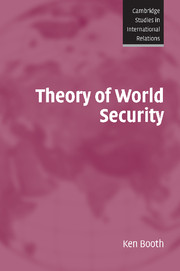Summary
This book is a work of analysis, argument, and advocacy. Its purpose is to explain and advance the case for a particular theoretical framework with which to explore and engage with the security of real people in real places. The overall approach is an attempt to construct a critical theory of security, and at its heart is emancipatory realism. Focusing on the primordial search for security, the book grapples with some of the biggest questions faced by human society. What is real? What can we know? How might we act? As such, it seeks to offer a theory for our times, a small bugle-call in an era of world-historical crisis.
Theory of World Security addresses various (overlapping) audiences: students of security within universities, people everywhere who are angry at the world they have inherited and disappointed at the complacency of the most powerful, and readers who already share the general conclusions of the book but who need more light to be shed on them. It would be encouraging if the book were to be read with an open mind by officials and politicians, or managers in control of the most powerful corporations: but I do not expect it. Nor do I expect much sympathy from the self-referential international relations orthodoxy in the United States and elsewhere – ‘realists’ of one sort or another – because the theorising represented here will be regarded as alien (even where it is allowed to be regarded as theory).
- Type
- Chapter
- Information
- Theory of World Security , pp. xii - xiiiPublisher: Cambridge University PressPrint publication year: 2007

